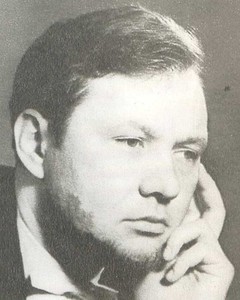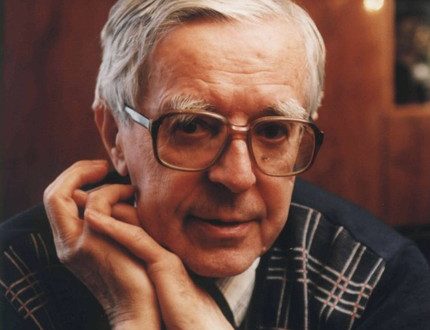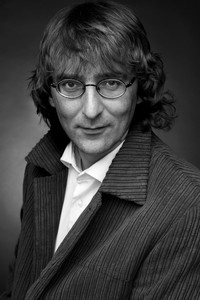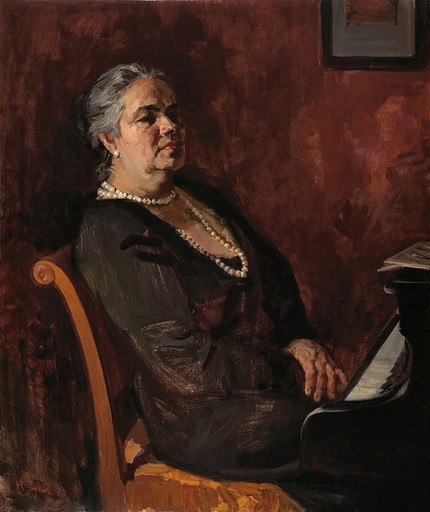
Tatiana Petrovna Nikolaeva |
Tatiana Nikolayeva

Tatyana Nikolaeva is a representative of the school of A. B. Goldenweiser. The school that gave Soviet art a number of brilliant names. It would not be an exaggeration to say that Nikolaeva is one of the best students of an outstanding Soviet teacher. And – no less remarkable – one of his characteristic representatives, Goldenweiser direction in musical performance: hardly anyone today embodies his tradition more consistently than she does. More will be said about this in the future.
- Piano music in the Ozon online store →
Tatyana Petrovna Nikolaeva was born in the town of Bezhitsa, Bryansk region. Her father was a pharmacist by profession and a musician by vocation. Having a good command of the violin and cello, he gathered around him the same as himself, music lovers and art lovers: impromptu concerts, musical meetings and evenings were constantly held in the house. Unlike her father, Tatyana Nikolaeva’s mother was engaged in music quite professionally. In her youth, she graduated from the piano department of the Moscow Conservatory and, linking her fate with Bezhitse, found here an extensive field for cultural and educational activities – she created a music school and brought up many students. As often happens in the families of teachers, she had little time to study with her own daughter, although, of course, she taught her the basics of piano playing when necessary. “No one pushed me to the piano, didn’t force me to work especially,” Nikolaeva recalls. I remember, having become older, I often performed in front of acquaintances and guests with whom our house was full. Even then, in childhood, it both worried and brought great joy.
When she was 13 years old, her mother brought her to Moscow. Tanya entered the Central Music School, having endured, perhaps, one of the most difficult and responsible tests in her life. (“About six hundred people applied for twenty-five vacancies,” recalls Nikolaeva. “Even then, the Central Music School enjoyed wide fame and authority.”) AB Goldenweiser became her teacher; at one time he taught her mother. “I spent whole days disappearing in his class,” says Nikolaeva, “it was extremely interesting here. Such musicians as A.F. Gedike, D.F. Oistrakh, S.N. Knushevitsky, S.E. Feinberg, E.D. Krutikova used to visit Alexander Borisovich at his lessons … The very atmosphere that surrounded us, the pupils of the great master, somehow elevated, ennobled, forced to take work, to herself, to art with all seriousness. For me, these were years of versatile and rapid development.”
Nikolaeva, like other pupils of Goldenweiser, is sometimes asked to tell, and in more detail, about her teacher. “I remember him first of all for his even and benevolent attitude towards all of us, his students. He did not single out anyone in particular, he treated everyone with the same attention and pedagogical responsibility. As a teacher, he was not too fond of “theorizing” – he almost never resorted to lush verbal ranting. He usually spoke a little, sparingly choosing words, but always about something practically important and necessary. Sometimes, he would drop two or three remarks, and the student, you see, begins to play somehow differently … We, I remember, performed a lot – at offsets, shows, open evenings; Alexander Borisovich attached great importance to the concert practice of young pianists. And now, of course, young people play a lot, but – look at the competitive selections and auditions – they often play the same thing … We used to play often and with different“That’s the whole point.”
1941 separated Nikolaeva from Moscow, relatives, Goldenweiser. She ended up in Saratov, where at that time part of the students and faculty of the Moscow Conservatory were evacuated. In the piano class, she is temporarily advised by the notorious Moscow teacher I. R. Klyachko. She also has another mentor – a prominent Soviet composer B. N. Lyatoshinsky. The fact is that for a long time, from childhood, she was drawn to composing music. (Back in 1937, when she entered the Central Music School, she played her own opuses at the admission tests, which, perhaps, prompted the commission to some extent to give her preference over others.) Over the years, composition became an urgent need for her, her second, and at times and the first, musical specialty. “It is, of course, very difficult to divide oneself between creativity and regular concert and performance practice,” says Nikolaeva. “I remember my youth, it was continuous work, work and work … In the summer I mostly composed, in the winter time I almost completely devoted myself to the piano. But how much this combination of two activities has given me! I am sure that I owe my results in performance to a large extent to him. When writing, you begin to understand such things in our business that a person who does not write is perhaps not given to understand. Now, by the nature of my activity, I constantly have to deal with performing youth. And, you know, sometimes after listening to a novice artist, I can almost unmistakably determine – by the meaningfulness of his interpretations – whether he is involved in composing music or not.
In 1943, Nikolaeva returned to Moscow. Her constant meetings and creative contact with Goldenweiser are renewed. And a few years later, in 1947, she triumphantly graduated from the piano faculty of the conservatory. With a triumph that did not come as a surprise to people in the know – by that time she had already firmly established herself in one of the first places among young metropolitan pianists. Her graduation program attracted attention: along with the works of Schubert (Sonata in B-flat major), Liszt (Mephisto-Waltz), Rachmaninov (Second Sonata), as well as Tatiana Nikolaeva herself’s Polyphonic Triad, this program included both volumes of Bach’s Well-Tempered Clavier (48 preludes and fugues). There are few concert players, even among the world’s pianistic elite, who would have the entire grandiose Bach cycle in their repertoire; here he was proposed to the state commission by a debutante of the piano scene, just getting ready to leave the student bench. And it was not just the magnificent memory of Nikolaeva – she was famous for her in her younger years, she is famous now; and not only in the colossal work put by her to prepare such an impressive program. The direction itself commanded respect repertory interests young pianist – her artistic inclinations, tastes, inclinations. Now that Nikolaeva is widely known to both specialists and numerous music lovers, the Well-Tempered Clavier at her final exam seems to be something quite natural – in the mid-forties this could not but surprise and delight. “I remember that Samuil Evgenievich Feinberg prepared “tickets” with the names of all Bach’s preludes and fugues,” says Nikolaeva, “and before the exam I was offered to draw one of them. It was indicated there that I got to play by lot. Indeed, the commission could not listen to my entire graduation program – it would have taken more than one day … “
Three years later (1950) Nikolaeva also graduated from the composer department of the conservatory. After B. N. Lyatoshinsky, V. Ya. Shebalin was her teacher in the composition class; she completed her studies with E. K. Golubev. For the successes achieved in musical activity, her name is entered on the marble Board of Honor of the Moscow Conservatory.
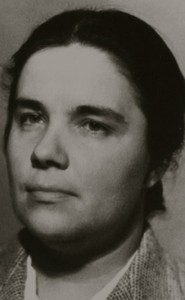
…Usually, when it comes to the participation of Nikolaeva in tournaments of performing musicians, they mean, first of all, her resounding victory at the Bach Competition in Leipzig (1950). In fact, she tried her hand at competitive battles much earlier. Back in 1945, she took part in the competition for the best performance of Scriabin’s music – it was held in Moscow at the initiative of the Moscow Philharmonic – and won the first prize. “The jury, I remember, included all the most prominent Soviet pianists of those years,” Nikolaev refers to the past, “and among them is my idol, Vladimir Vladimirovich Sofronitsky. Of course, I was very worried, especially since I had to play the crown pieces of “his” repertoire – etudes (Op. 42), Scriabin’s Fourth Sonata. Success in this competition gave me confidence in myself, in my strength. When you take your first steps in the field of performing, it is very important.”
In 1947, she again competed at the piano tournament held as part of the First Democratic Youth Festival in Prague; here she is in second place. But Leipzig really became the apogee of Nikolaeva’s competitive achievements: it attracted the attention of wide circles of the musical community – not only Soviet, but also foreign, to the young artist, opened the doors to the world of great concert performance for her. It should be noted that the Leipzig competition in 1950 was in its time an artistic event of high rank. Organized to commemorate the 200th anniversary of Bach’s death, it was the first competition of its kind; later they became traditional. Another thing is no less important. It was one of the first international forums of musicians in post-war Europe and its resonance in the GDR, as well as in other countries, was quite great. Nikolaev, delegated to Leipzig from the pianistic youth of the USSR, was in her prime. By that time, her repertoire included a fair amount of Bach’s works; she also mastered the convincing technique of interpreting them: The victory of the pianist was unanimous and indisputable (as the young Igor Bezrodny was the undisputed winner of the violinists at that time); the German music press hailed her as the “queen of fugues”.
“But for me,” Nikolaeva continues the story of her life, “the fiftieth year was significant not only for the victory in Leipzig. Then another event took place, the significance of which for myself I simply cannot overestimate – my acquaintance with Dmitri Dmitrievich Shostakovich. Together with P. A. Serebryakov, Shostakovich was a member of the jury of the Bach Competition. I had the good fortune to meet him, to see him up close, and even – there was such a case – to participate with him and Serebryakov in a public performance of Bach’s triple concerto in D minor. The charm of Dmitry Dmitrievich, the exceptional modesty and spiritual nobility of this great artist, I will never forget.
Looking ahead, I must say that Nikolaeva’s acquaintance with Shostakovich did not end. Their meetings continued in Moscow. At the invitation of Dmitry Dmitrievich Nikolaev, she visited him more than once; she was the first to play many of the preludes and fugues (Op. 87) that he created at that time: they trusted her opinion, consulted with her. (Nikolaeva is convinced, by the way, that the famous cycle “24 Preludes and Fugues” was written by Shostakovich under the direct impression of the Bach festivities in Leipzig and, of course, the Well-Tempered Clavier, which was repeatedly performed there). Subsequently, she became an ardent propagandist of this music – she was the first to play the whole cycle, recorded it on gramophone records.
What was the artistic face of Nikolaeva in those years? What was the opinion of the people who saw her at the origins of her stage career? Criticism agrees about Nikolaeva as “a first-rate musician, a serious, thoughtful interpreter” (G. M. Kogan) (Kogan G. Questions of pianism. S. 440.). She, according to Ya. I. Milshtein, “attaches great importance to the creation of a clear performing plan, the search for the main, defining thought of performance … This is a smart skill,” sums up Ya. I. Milshtein, “… purposeful and deeply meaningful” (Milshtein Ya. I. Tatyana Nikolaeva // Sov. Music. 1950. No. 12. P. 76.). Experts note the classically strict school of Nikolaeva, her accurate and accurate reading of the author’s text; approvingly speak of her inherent sense of proportion, almost infallible taste. Many see in all this the hand of her teacher, A. B. Goldenweiser, and feel his pedagogical influence.
At the same time, quite serious criticisms were sometimes expressed to the pianist. And no wonder: her artistic image was just taking shape, and at such a time everything is in sight – pluses and minuses, advantages and disadvantages, strengths of talent and relatively weak ones. We have to hear that the young artist sometimes lacks inner spirituality, poetry, high feelings, especially in the romantic repertoire. “I remember Nikolaeva well at the beginning of her journey,” G. M. Kogan later wrote, “… there was less fascination and charm in her playing than culture” (Kogan G. Questions of pianism. P. 440.). Complaints are also made regarding Nikolaeva’s timbre palette; the sound of the performer, some of the musicians believe, lacks juiciness, brilliance, warmth, and variety.
We must pay tribute to Nikolaeva: she never belonged to those who fold their hands – whether in successes, in failures … And as soon as we compare her music-critical press for the fifties and, for example, for the sixties, the differences will be revealed with all obviousness. “If earlier at Nikolaeva the logical beginning is clearly prevailed over the emotional, depth and richness – over artistry and spontaneity, – writes V. Yu. Delson in 1961, – then at present these inseparable parts of the performing arts complement each other” (Delson V. Tatyana Nikolaeva // Soviet Music. 1961. No. 7. P. 88.). “… The current Nikolaeva is unlike the former one,” G. M. Kogan states in 1964. “She managed, without losing what she had, to acquire what she lacked. Today’s Nikolaeva is a strong, impressive performing individual, in whose performance high culture and precise craftsmanship are combined with freedom and artistry of artistic expression. (Kogan G. Questions of pianism. S. 440-441.).
Intensively giving concerts after successes at competitions, Nikolaeva at the same time does not leave her old passion for composition. Finding time for it as the touring performance activity expands, however, becomes more and more difficult. And yet she tries not to deviate from her rule: in the winter – concerts, in the summer – an essay. In 1951, her First Piano Concerto was published. Around the same time, Nikolaeva wrote a sonata (1949), “Polyphonic Triad” (1949), Variations in Memory of N. Ya. Myaskovsky (1951), 24 concert studies (1953), in a later period – the Second Piano Concerto (1968). All this is dedicated to her favorite instrument – the piano. She quite often includes the above-named compositions in the programs of her clavirabends, although she says that “this is the most difficult thing to perform with your own things…”.
The list of works written by her in other, “non-piano” genres looks quite impressive – symphony (1955), orchestral picture “Borodino Field” (1965), string quartet (1969), Trio (1958), Violin sonata (1955), Poem for cello with orchestra (1968), a number of chamber vocal works, music for theater and cinema.
And in 1958, the “polyphony” of Nikolaeva’s creative activity was supplemented by another, new line – she began to teach. (The Moscow Conservatory invites her.) Today there are many talented young people among her pupils; some have successfully shown themselves at international competitions – for example, M. Petukhov, B. Shagdaron, A. Batagov, N. Lugansky. Studying with her students, Nikolaeva, according to her, relies on the traditions of her native and close Russian piano school, on the experience of her teacher A. B. Goldenweiser. “The main thing is the activity and breadth of cognitive interests of students, their inquisitiveness and curiosity, I appreciate this most of all,” she shares her thoughts on pedagogy. ”of the same programs, even though this testified to a certain persistence of the young musician. Unfortunately, today this method is more in fashion than we would like …
A conservatory teacher who studies with a gifted and promising student faces a lot of problems these days,” Nikolaeva continues. If so… How, how to ensure that the talent of a student after a competitive triumph – and the scale of the latter is usually overestimated – does not fade, does not lose its former scope, does not become stereotyped? That is the question. And in my opinion, one of the most topical in modern musical pedagogy.
Once, speaking on the pages of the Soviet Music magazine, Nikolaeva wrote: “The problem of continuing the studies of those young performers who become laureates without graduating from the conservatory is becoming especially acute. Being carried away by concert activities, they cease to pay attention to their comprehensive education, which violates the harmony of their development and negatively affects their creative image. They still need to study calmly, attend lectures carefully, feel like really students, and not “tourists” to whom everything is forgiven … “And she concluded as follows:” … It is much more difficult to keep what has been won, strengthen their creative positions, convince others of their creative credo . This is where the difficulty comes in.” (Nikolaeva T. Reflections after the finish: Towards the results of the VI International Tchaikovsky Competition // Sov. Music. 1979. No. 2. P. 75, 74.). Nikolaeva herself perfectly managed to solve this really difficult problem in her time – to resist after an early and
major success. She was able to “keep what she had won, strengthen her creative position.” First of all, thanks to inner composure, self-discipline, a strong and confident will, and the ability to organize one’s time. And also because, alternating different types of work, she boldly went towards great creative loads and superloads.
Pedagogy takes away from Tatyana Petrovna all the time that remains from concert trips. And, nevertheless, it is precisely today that she feels more clearly than ever before that communication with young people is necessary for her: “It is necessary to keep up with life, not to grow old in soul, in order to feel, as they say, the pulse of the present day. And then one more. If you are engaged in a creative profession and have learned something important and interesting in it, you will always be tempted to share it with others. It’s so natural…”
* * *
Nikolaev today represents the older generation of Soviet pianists. On her account, neither less nor more – about 40 years of almost continuous concert and performance practice. However, Tatyana Petrovna’s activity does not decrease, she still performs vigorously and performs a lot. In the last decade, perhaps even more than before. Suffice it to say that the number of her clavirabends reaches about 70-80 per season – a very, very impressive figure. It is not difficult to imagine what kind of “burden” this is in the presence of others. (“Of course, sometimes it’s not easy,” Tatyana Petrovna once remarked, “however, concerts are perhaps the most important thing for me, and therefore I will play and play as long as I have enough strength.”)
Over the years, Nikolaeva’s attraction to large-scale repertory ideas has not diminished. She always felt a penchant for monumental programs, for spectacular thematic series of concerts; loves them to this day. On the posters of her evenings one can see almost all of Bach’s clavier compositions; she has performed only one gigantic Bach opus, The Art of Fugue, dozens of times in recent years. She often refers to the Goldberg Variations and Bach’s Piano Concerto in E Major (usually in collaboration with the Lithuanian Chamber Orchestra conducted by S. Sondeckis). For example, both of these compositions were played by her at the “December Evenings” (1987) in Moscow, where she performed at the invitation of S. Richter. Numerous monograph concerts were also announced by her in the eighties – Beethoven (all piano sonatas), Schumann, Scriabin, Rachmaninov, etc.
But perhaps the greatest joy continues to bring her the performance of Shostakovich’s Preludes and Fugues, which, we recall, have been included in her repertoire since 1951, that is, from the time when they were created by the composer. “Time passes, and the purely human appearance of Dmitriy Dmitrievich, of course, partly fades, is erased from memory. But his music, on the contrary, is getting closer and closer to people. If earlier not everyone was aware of its significance and depth, now the situation has changed: I practically do not meet audiences in which Shostakovich’s works would not arouse the most sincere admiration. I can judge this with confidence, because I play these works literally in all corners of our country and abroad.
By the way, recently I found it necessary to make a new recording of Shostakovich’s Preludes and Fugues in the Melodiya studio, because the previous one, dating back to the early sixties, is somewhat outdated.
The year 1987 was exceptionally eventful for Nikolaeva. In addition to the “December Evenings” mentioned above, she visited major music festivals in Salzburg (Austria), Montpellier (France), Ansbach (West Germany). “Trips of this kind are not only labor – although, of course, first of all it is labor,” says Tatyana Petrovna. “Nevertheless, I would like to draw attention to one more point. These trips bring a lot of bright, varied impressions – and what would art be without them? New cities and countries, new museums and architectural ensembles, meeting new people – it enriches and broadens one’s horizons! For example, I was greatly impressed by my acquaintance with Olivier Messiaen and his wife, Madame Lariot (she is a pianist, performs all his piano compositions).
This acquaintance took place quite recently, in the winter of 1988. Looking at the famous maestro, who, at the age of 80, is full of energy and spiritual strength, you involuntarily think: this is who you need to be equal to, who to take an example from …
I learned a lot of useful things for myself recently at one of the festivals, when I heard the phenomenal Negro singer Jessie Norman. I am a representative of another musical specialty. However, having visited her performance, she undoubtedly replenished her professional “piggy bank” with something valuable. I think that it needs to be replenished always and everywhere, at every opportunity … “
Nikolaeva is sometimes asked: when does she rest? Does he take breaks from music lessons at all? “And I, you see, do not get tired of music,” she replies. And I don’t understand how you can even get fed up with it. That is, of gray, mediocre performers, of course, you can get tired, and even very quickly. But that doesn’t mean that you’re tired of music…”
She often recalls, speaking on such topics, the wonderful Soviet violinist David Fedorovich Oistrakh – she had a chance to tour abroad with him at one time. “It was a long time ago, in the mid-fifties, during our joint trip to Latin American countries – Argentina, Uruguay, Brazil. Concerts there began and ended late – after midnight; and when we returned to the hotel, exhausted, it was usually already about two or three o’clock in the morning. So, instead of going to rest, David Fedorovich said to us, his companions: what if we listen to some good music now? (Long-playing records had just appeared on store shelves at that time, and Oistrakh was passionately interested in collecting them.) Refusing was out of the question. If any of us did not show much enthusiasm, David Fedorovich would be terribly indignant: “Don’t you like music?”…
So the main thing is love music, concludes Tatyana Petrovna. Then there will be enough time and energy for everything.”
She still has to deal with various unresolved tasks and difficulties in performing – despite her experience and many years of practice. She considers this to be completely natural, for only by overcoming the resistance of the material can one move forward. “All my life I have struggled, for example, with problems related to the sound of an instrument. Not everything in this regard satisfied me. And the criticism, to tell the truth, did not let me calm down. Now, it seems, I have found what I was looking for, or, in any case, close to it. However, this does not mean at all that tomorrow I will be satisfied with what more or less suits me today.
The Russian school of piano performance, Nikolaeva develops his idea, has always been characterized by a soft, melodious manner of playing. This was taught by K. N. Igumnov, and A. B. Goldenweiser, and other prominent musicians of the older generation. Therefore, when she notices that some young pianists treat the piano harshly and rudely, “knocking”, “pounding”, etc., it really discourages her. “I’m afraid that today we are losing some very important traditions of our performing arts. But losing, losing something is always easier than saving … “
And one more thing is the subject of constant reflection and search for Nikolaeva. Simplicity of musical expression .. That simplicity, naturalness, clarity of style, which many (if not all) artists eventually come to, regardless of the type and genre of art they represent. A. France once wrote: “The longer I live, the stronger I feel: there is no Beautiful, which at the same time would not be simple.” Nikolaeva fully agrees with these words. They are the best way to convey what seems to her today the most important in artistic creativity. “I will only add that in my profession, the simplicity in question comes down primarily to the problem of the stage condition of the artist. The problem of inner well-being during performance. You can feel differently before going on stage – better or worse. But if one succeeds in psychologically adjusting oneself and entering the state I am talking about, the main thing, one can consider, has already been done. It’s rather difficult to describe all this in words, but with experience, with practice, you become more and more deeply imbued with these sensations…
Well, at the heart of everything, I think, are simple and natural human feelings, which are so important to preserve … There is no need to invent or invent anything. You just need to be able to listen to yourself and strive to express yourself more truthfully, more directly in music. That’s the whole secret.”
…Perhaps, not everything is possible for Nikolaeva equally. And specific creative results, apparently, do not always correspond to what is intended. Probably, one of her colleagues will not “agree” with her, prefer something else in pianism; to some, her interpretations may not seem so convincing. Not so long ago, in March 1987, Nikolaeva gave a clavier band in the Great Hall of the Moscow Conservatory, dedicating it to Scriabin; one of the reviewers on this occasion criticized the pianist for her “optimistic-comfortable worldview” in Scriabin’s works, argued that she lacks genuine drama, internal struggles, anxiety, acute conflict: “Everything is done somehow too naturally … in the spirit of Arensky (Sov. music. 1987. No. 7. S. 60, 61.). Well, everyone hears music in their own way: one – so, the other – differently. What could be more natural?
Something else is more important. The fact that Nikolaeva is still on the move, in tireless and energetic activity; that she still, as before, does not indulge herself, retains her invariably good pianistic “form”. In a word, he does not live by yesterday in art, but by today and tomorrow. Isn’t this the key to her happy fate and enviable artistic longevity?
G. Tsypin, 1990



